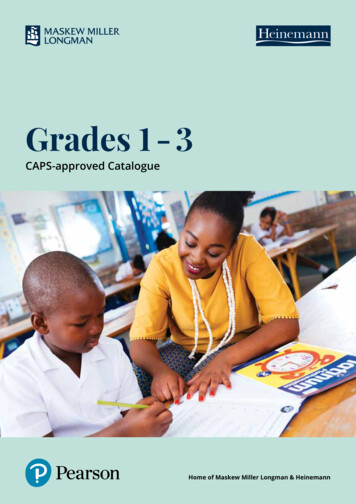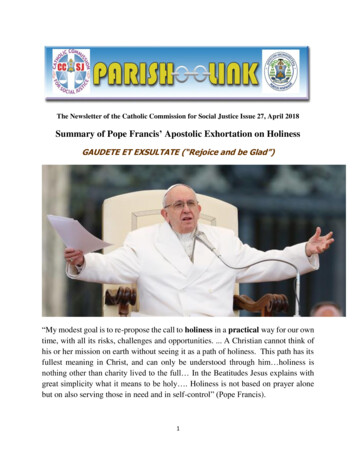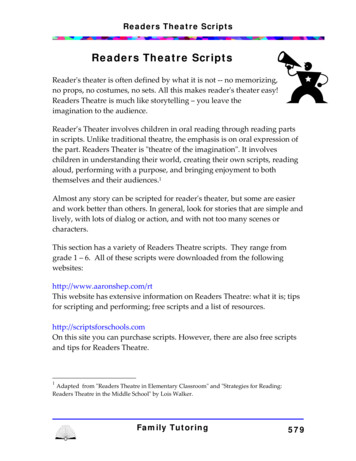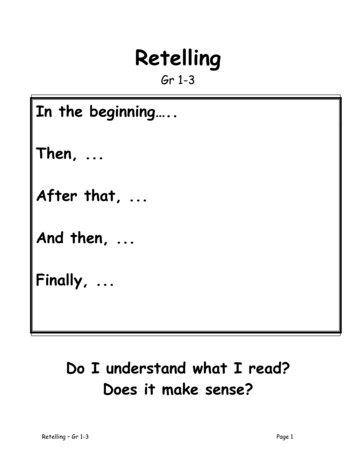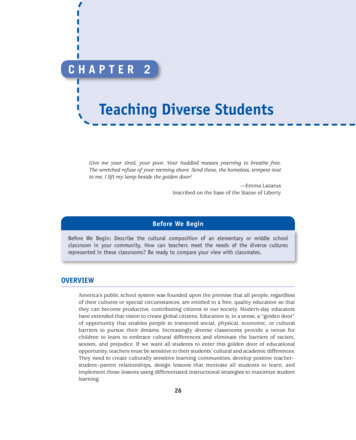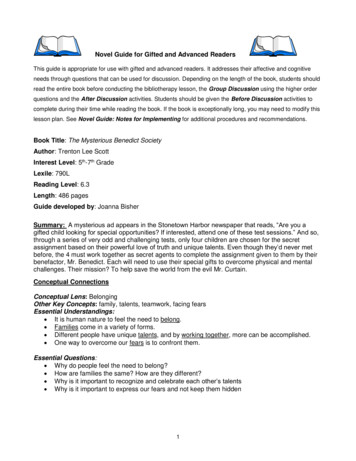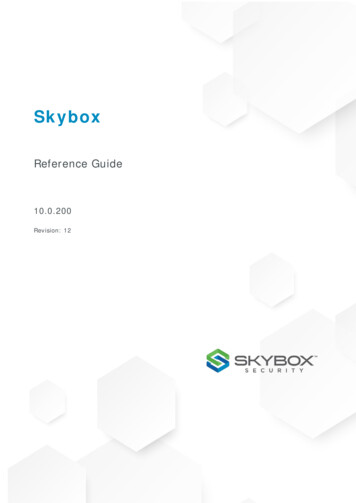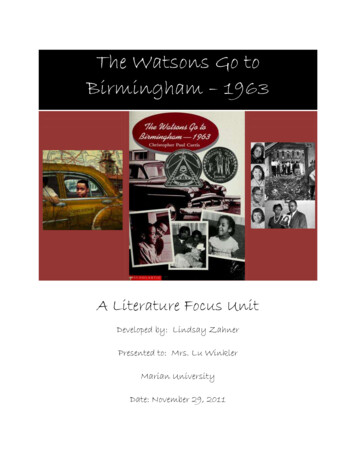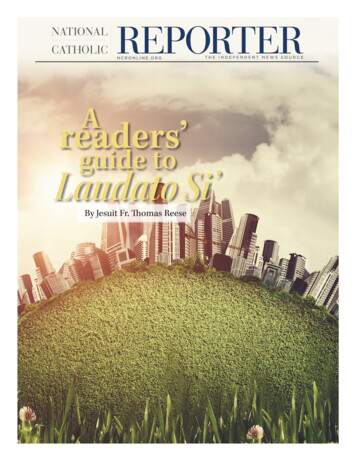
Transcription
NCRONLINE.ORGAreaders’guide toLaudato Si’By Jesuit Fr. Thomas Reese
2NCRONLINE.ORGNATIONAL CATHO LIC REPORTER—Newscom/MintImages/Frans LantingA reforestationnursery inMontes Claros,BrazilOne of the many marvelous things about Pope Francis’encyclical on the environment, “ Laudato Si’, on Carefor Our Common Home,” is that it is written in a veryaccessible style. It does not read like an academic tomeas have many encyclicals of the past. Anyone who canread a newspaper can read this encyclical and getsomething out of it.True, it is 190 pages and about 40,000 words, butthe six chapters flow nicely. It is not a hard read.The encyclical is great for individual reading, buteven better for a book club, class or discussion group.Reading and discussing the encyclical in a group isexactly what is called for because throughout theletter, there are calls to dialogue.There is no need forpeople to wait while the bishops and pastors organizea response to the encyclical. Anyone can downloadthe encyclical*, call their friends and say, “Let’s read anddiscuss the encyclical.” Anyone part of a book club can recommend that the encyclical be their next read.The impactof the encyclical is going to be significant even outside theCatholic church. Environmentalists andscientists have endorsed the document.Likewise, non-Catholic religious leadersare eager to discuss the encyclical,which will become a topic of ecumenicaland interreligious dialogue.So here is a readers’ guide with studyquestions to help in reading the encyclical. Because of the richness of the content, I would suggest taking one chapterat a time for reading and discussion.There are lots of questions. Use the onesyou find helpful for discussion; don’t feelyou have to answer them yclicals/documents/papa-francesco 20150524enciclica-laudato-si.htmlThe introductionThe pope begins the encyclical by summarizing his presentation and citingearlier popes and other religious leaders who have spoken about the environment. He says Sister Earth “cries out to us because of the harm we have inflicted on her by our irresponsible use and abuse of the goods with which God hasendowed her.”Questions:1. Where have you seen harm inflicted on Sister Earth (Paragraph 2)?2. Why do you think few people knew that Popes Paul VI, John Paul IIand Benedict XVI spoke out on environmental issues (4-6)?3. St. Francis of Assisi has been called the patron saint of theenvironment. What is attractive about him (10-12)?—NCR photo/Joshua J. McElweeA statue of St. Francis looks outover Assisi, Italy.4. Pope Francis concludes his introduction with an appeal (13-16).What is your response?
NATIONAL CATHOLIC REPORTERNCRONLINE.ORG3Chapter 1: What is happening to our common homePope Francis is a firm believer in the need to gather the facts in order to understand a problem. Chapter 1 presents the scientific consensus on climate changealong with a description of other threats to the environment, including threats towater supplies and biodiversity. He also looks at how environmental degradationhas affected human life and society. Finally, he writes about the global inequalityof the environmental crisis.Questions:1. How has pollution affected youor your family personally?2. What does the pope mean by a“throwaway culture” (22)? Do youagree with him? Why?3. What does the pope mean whenhe says, “The climate is a commongood” (23)?4. What is the evidence thatclimate change is happening andis caused by human activity (23)?What will be its effects?—CNS/Paul JeffreyA girl fills a container with muddywater in April 2014 in the AjuongThok Refugee Camp in South Sudan.5. The pope says that “access tosafe drinkable water is a basic anduniversal human right,” yet manypoor people do not have access toit (27-31). Why is this? What can bedone?6. Why does the pope think biodiversity is important (32-42)? Whatare the threats to biodiversity?7. What are the effects on people’slives of environmental deterioration,current models of development, andthe throwaway culture (43-47)?8. Why does the pope believe “wecannot adequately combat environmental degradation unless weattend to causes related to humanand social degradation” (48)?9. Why does the pope think thatsimply reducing birth rates of thepoor is not a just or adequate response to the problem of poverty orenvironmental degradation (50)?10. “A true ‘ecological debt’ exists,particularly between the globalnorth and south,” the pope writes(51). What does he mean?11. Why does the pope think theresponse to the world’s environmental crisis has been weak (53)?Chapter 2: The Gospel of creationThe pope argues that faith convictions can motivate Christians to care for natureand for the most vulnerable of their brothers and sisters. He begins with thebiblical account of creation and then meditates on the mystery of the universe,which he sees as a continuing revelation of the divine. “Everything is related,and we human beings are united as brothers and sisters on a wonderfulpilgrimage, woven together by the love God has for each of his creaturesand which also unites us in fond affection with brother sun, sister moon,brother river and mother earth.” He concludes, “The earth is essentially ashared inheritance, whose fruits are meant to benefit everyone.”Questions:1. According to Francis, the Bible teaches that the harmony between thecreator, humanity, and creation was disrupted by our presuming to take theplace of God and refusing to acknowledge our creaturely limitations (66). Whatdoes it mean to presume to take the place of God?2. How does Francis interpret Genesis 1:28, which grants humankind dominion over the earth (67)?3. How does Francis use the Bible to support his view that the gift of the earth—NASA
4NCRONLINE.ORGNATIONAL CATHO LIC REPORTERwith its fruits belongs to everyone (71)?4. In reflecting on the mystery of the universe, what does Francis meanby saying that “creation is of the order of love” (77)?5. What is our role “in this universe, shaped by open and intercommunicating systems” where “we can discern countless forms of relationship andparticipation” (79)?6. Francis says, “Creating a world in need of development, God in someway sought to limit himself in such a way that many of the things wethink of as evils, dangers or sources of suffering, are in reality part of thepains of childbirth which he uses to draw us into the act of cooperationwith the Creator” (80). How do you understand this?7. If the ultimate purpose of other creatures is not to be found in us,how do we and other creatures fit into God’s plan (83)?8. Alongside revelation contained in Scripture, “there is a divine manifestation in the blaze of the sun and the fall of night” (85). How have youexperienced God in creation?9. What is your reaction to the hymn of St. Francis of Assisi (87)?10. “The Christian tradition has never recognized the right to privateproperty as absolute or inviolable, and has stressed the social purpose ofall forms of private property” (93). When can the right to private propertybe subordinated to the common good?—CNS/EPA/Narendra ShresthaA Nepalese man hugs a tree while celebrating World Environment Day atthe forest of Gokarna, on the outskirtsof Kathmandu, in 2014.11. What was the attitude of Jesus toward creation (96-100)?—CNS/Reuters/Romeo RanocoA volunteer picks up trash at FreedomIsland, a marshland considered to be asanctuary for birds, fish and mangroves,in the Philippines in April 2015.—CNS/Tyler OrsburnA mound of coal after being processed near Whitesville, W.Va., in August 2014Chapter 3: The human roots of the ecological crisisAlthough science and technology “can produce important means of improving thequality of human life,” they have also “given those with the knowledge, and especially theeconomic resources to use them, an impressive dominance over the whole of humanityand the entire world.” Francis says we are enthralled with a technocratic paradigm, whichpromises unlimited growth. But this paradigm “is based on the lie that there is an infinite supply of the earth’s goods, and this leads to the planet being squeezed dry beyondevery limit.” Those supporting this paradigm show “no interest in more balanced levels ofproduction, a better distribution of wealth, concern for the environment and the rights offuture generations. Their behavior shows that for them maximizing profits is enough.”
NATIONAL CATHOLIC REPORTERQuestions:1. What is Francis’ attitudetoward technology? What doeshe mean by the technocraticparadigm (101, 106-114)?2. How does Francis arguethat “technological productsare not neutral,” (107, 114) that“the technocratic paradigm alsotends to dominate economic andpolitical life” (109)?3. Francis says, “We are all tooslow in developing economicinstitutions and social initiativeswhich can give the poor regularaccess to basic resources” (109).What does he mean? Why doesthis happen?NCRONLINE.ORG4. Francis asserts that “by itselfthe market cannot guarantee integral human development andsocial inclusion” (109). Why doeshe say this? Do you agree?5. Francis argues, “To seekonly a technical remedy to eachenvironmental problem whichcomes up is to separate what isin reality interconnected and tomask the true and deepest problems of the global system” (111).What are the true and deepestproblems of the global system inFrancis’ mind?6. Francis calls for a broadenedvision (112), “a bold cultural revolution” (114). What would thatlook like?7. What does Francis meanby “modern anthropocentrism”(115)?8. For Francis, “the presentecological crisis is one small signof the ethical, cultural and spiritual crisis of modernity” (119).What does Francis mean by“practical relativism” (122) andcultural relativism (123)?9. Why does Francis argue thatany approach to integrated ecology must also protect employment (124)?10. What does Francis see asthe positive and negative aspectsof biological technologies (130136)?—CNS/Reuters/Ricardo MoraesA woman holdsher child at theentrance of herhouse in a slumarea of Rio deJaneiro in April2013.Chapter 4: Integral ecologyRecognizing the reasons why a given area is polluted requires a study of the workings of society, its economy, its behavior, and the ways it grasps reality. We are notfaced with two separate crises, one environmental and the other social, but ratherwith one complex crisis that is both social and environmental. Strategies for a solution demand an integrated approach to combating poverty, restoring dignity to theexcluded, and at the same time protecting nature.Questions:1. Why does Francis argue that “we are faced not with two separate crises, one environmental and the other social, but rather with one complexcrisis which is both social and environmental” (139)?2. What would it mean to have “an integrated approach to combating poverty,restoring dignity to the excluded, and at the same time protecting nature” (139)?5
6NCRONLINE.ORGNATIONAL CATHOLIC REPORTERto them (140)?4. Why do “we urgently need ahumanism capable of bringingtogether the different fields ofknowledge, including economics, in the service of a moreintegral and integrating vision”(141)?5. Francis speaks of an “integral ecology” that combines environmental (138-140), economic (141), social (142), and cultural(143) ecologies. What does thatmean? How does it work?—CNS/Reuters/Borja SuarezA man collects fuel oil fromrocks in April 2015 following anoil spill along Veneguera beachin Spain’s Canary Islands.3. Why does Francis think it isimportant for us to understandecosystems and our relationship6. How does the environmentof our homes, workplace, andneighborhoods affect our qualityof life (147)?7. How does poverty, overcrowding, lack of open spaces,and poor housing affect the poor(149)? Why are these environmental issues?8. What does Francis mean by“the common good” (156)?9. What are the consequencesof seeing the earth as a gift thatwe have freely received and mustshare with others and that alsobelongs to those who will followus (159)?10. “What is the purpose of ourlife in this world? Why are wehere? What is the goal of our workand all our efforts? What needdoes the earth have of us” (160)?11. Why does Francis say,“Doomsday predictions can nolonger be met with irony or disdain” (161)?12. What does Francis meanwhen he says, “An ethical andcultural decline . has accompanied the deterioration of theenvironment” (162)?Chapter 5: Lines of approach and actionWhat is to be done? Francis calls for dialogue onenvironmental policy in the international, national and local communities. This dialogue mustinclude transparent decision-making so that thepolitics serve human fulfillment and not just economic interests. It also involves dialogue betweenreligions and science working together for thecommon good.—CNS/Barbara FraserValerio Mendoza, 83, joins a Nov. 30, 2014, vigil for climatechange on the eve of the U.N. climate summit in Lima, Peru.Questions:period may well be remembered as one of the mostirresponsible in history” (165)?1. The word “dialogue” is repeated throughoutthis chapter. What does it mean and why doesFrancis think it is important?4. What does Francis see as the successes andfailures of the global response to environmentalissues (166-169)?2. Francis speaks of the need for a global consensus for confronting problems. Why is it needed,and how is it going to be achieved (164)?5. What international strategies does Francisoppose in responding to the environmental crisis(170-171), and which does he support (172-172)?3. Why does he think that “the post-industrial6. Francis argues, “The same mindset which
NATIONAL CATHOLIC REPORTERNCRONLINE.ORGstands in the way of making radical decisions toreverse the trend of global warming also stands inthe way of achieving the goal of eliminating poverty” (175). What is this mindset?political, economic and environmental issues?7. “Given the real potential for a misuse ofhuman abilities,” Francis argues, “individualstates can no longer ignore their responsibility forplanning, coordination, oversight and enforcementwithin their respective borders” (177). What doesthat mean for the United States?8. “The Church does not presume to settlescientific questions or to replace politics,” Francissays. “But I am concerned to encourage an honestand open debate so that particular interests orideologies will not prejudice the common good”(188). What is the proper role of the church in9. Francis is critical of many business practices, has no faith in the marketplace to safeguardthe environment, and sees a robust role for government in the regulation of the economy andprotecting the environment. How will Americansrespond to this? How do you?10. What does Francis mean when he says,“There is a need to change ‘models of global development’ ” (194)? What is wrong with the currentmodels? What would the new models look like?11. What are the separate roles of religion andscience, and how can they dialogue and work together (199-201)?Chapter 6: Ecological education and spiritualityWe need to change and develop new convictions, attitudes and forms of life, including anew lifestyle. This requires not only individual conversion, but also community networksto solve the complex situation facing our world today. Essential to this is a spirituality thatcan motivate us to a more passionate concern for the protection of our world. Christianspirituality proposes a growth and fulfillment marked by moderation and the capacity tobe happy with little. Love, overflowing with small gestures of mutual care, is also civic andpolitical, and it makes itself felt in every action that seeks to build a better world.Questions:1. Throughout this encyclical, Francis linksconcern for the poor with the environment.Why does he do that?2. Francis is critical of a consumerist lifestyle(204). Why? What would a new lifestyle looklike?3. What could be the political and economic impact of a widespread change in lifestyles(206)?4. What does Francis see as the role of environmental education in increasing awarenessand changing habits (210-211)?5. What does Francis mean by an ecologicalspirituality, and how can it motivate us to apassionate concern for the protection of ourworld (216)?6. Self-improvement on the part of individualswill not by itself remedy the extremely complexsituation we face today, according to Francis.What is the role for community networks?Governments?—CNS/Nancy WiechecA sign greets visitors to the meditation garden at theFranciscan Renewal Center in Scottsdale, Ariz., in October 2014.7
8NCRONLINE.ORGNATIONAL CATHO LIC REPORTER7. What are the attitudes that foster a spirit ofgenerous care (220-221)?8. Granted all of the problems we face, whatgives Francis joy and peace (222-227)?9. Love must also be civic and political, according to Francis. “Social love moves us to deviselarger strategies to halt environmental degradation and to encourage a ‘culture of care’ whichpermeates all of society.” How can we encouragecivic and political love in the United States?10. Francis proposes that the natural world isintegral to our sacramental and spiritual lives(233-242). How have you experienced this?—Newscom/CQ Roll Cal/Tom Williams11. How is this encyclical going to change yourlife?Kids participate in a “play-in” in support of the EPA’s CleanPower Plan in July 2014 in Washington, D.C.For additional reading on the encyclical, see Francis: The Environment Encyclical at ncyclical.Editor’s note: We can send you email newsletterswith the latest Catholic news and columns. Sign up atNCRonline.org/free-newsletters.NOTES:[Jesuit Fr. Thomas J. Reese’s column appears regularly in National Catholic Reporter.]National Catholic Reporter is an independentCatholic news source. To subscribeto our biweekly newspaper, visitNCRonline.org/subscribe.
9. Why does the pope think that simply reducing birth rates of the poor is not a just or adequate re - sponse to the problem of poverty or environmental degradation (50)? 10. “A true ‘ecological debt’ exists, particularly between the global north and south,” the pope writes (51). What does he m
